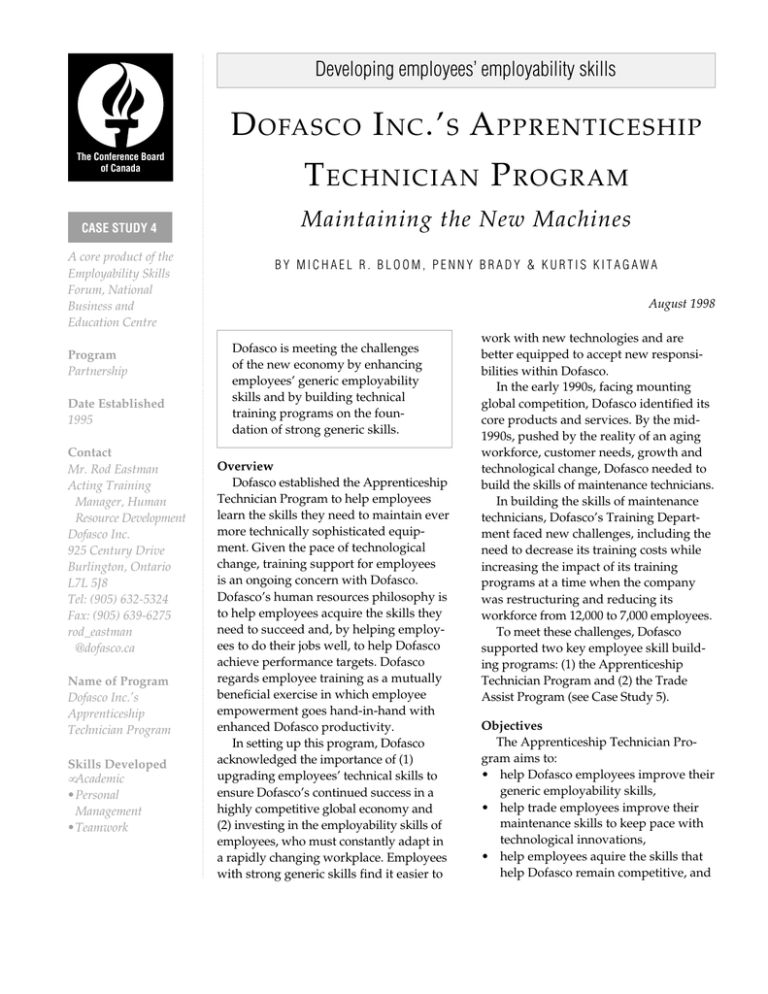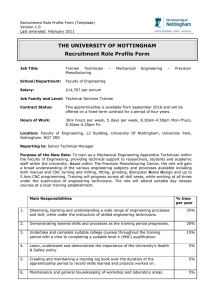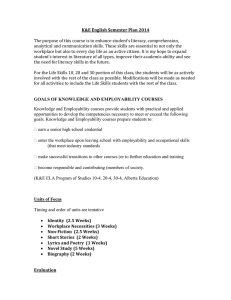
CASE STUDY 4
A core product of the
Employability Skills
Forum, National
Business and
Education Centre
Program
Partnership
Date Established
1995
Contact
Mr. Rod Eastman
Acting Training
Manager, Human
Resource Development
Dofasco Inc.
925 Century Drive
Burlington, Ontario
L7L 5J8
Tel: (905) 632-5324
Fax: (905) 639-6275
rod_eastman
@dofasco.ca
Name of Program
Dofasco Inc.’s
Apprenticeship
Technician Program
Skills Developed
• Academic
•Personal
Management
•Teamwork
..............................................................................................................................................................................................................................................................................................................................................................................................................................................................................................................
The Conference Board
of Canada
Developing employees’ employability skills
D OFASCO I NC .’ S A PPRENTICESHIP
T ECHNICIAN P ROGRAM
Maintaining the New Machines
BY MICHAEL R. BLOOM, PENNY BRADY & KURTIS KITAGAWA
August 1998
Dofasco is meeting the challenges
of the new economy by enhancing
employees’ generic employability
skills and by building technical
training programs on the foundation of strong generic skills.
Overview
Dofasco established the Apprenticeship
Technician Program to help employees
learn the skills they need to maintain ever
more technically sophisticated equipment. Given the pace of technological
change, training support for employees
is an ongoing concern with Dofasco.
Dofasco’s human resources philosophy is
to help employees acquire the skills they
need to succeed and, by helping employees to do their jobs well, to help Dofasco
achieve performance targets. Dofasco
regards employee training as a mutually
beneficial exercise in which employee
empowerment goes hand-in-hand with
enhanced Dofasco productivity.
In setting up this program, Dofasco
acknowledged the importance of (1)
upgrading employees’ technical skills to
ensure Dofasco’s continued success in a
highly competitive global economy and
(2) investing in the employability skills of
employees, who must constantly adapt in
a rapidly changing workplace. Employees
with strong generic skills find it easier to
1
The Conference Board of Canada
work with new technologies and are
better equipped to accept new responsibilities within Dofasco.
In the early 1990s, facing mounting
global competition, Dofasco identified its
core products and services. By the mid1990s, pushed by the reality of an aging
workforce, customer needs, growth and
technological change, Dofasco needed to
build the skills of maintenance technicians.
In building the skills of maintenance
technicians, Dofasco’s Training Department faced new challenges, including the
need to decrease its training costs while
increasing the impact of its training
programs at a time when the company
was restructuring and reducing its
workforce from 12,000 to 7,000 employees.
To meet these challenges, Dofasco
supported two key employee skill building programs: (1) the Apprenticeship
Technician Program and (2) the Trade
Assist Program (see Case Study 5).
Objectives
The Apprenticeship Technician Program aims to:
• help Dofasco employees improve their
generic employability skills,
• help trade employees improve their
maintenance skills to keep pace with
technological innovations,
• help employees aquire the skills that
help Dofasco remain competitive, and
Education Centre (NBEC)
Director:
MaryAnn McLaughlin
Research Associates:
Michael Bloom
Kurtis Kitagawa
Joeanne Mahoney
Douglas Watt
Awards Co-ordinator:
Linda Scott
Program and Research Assistant:
Jean Smith
NBEC Mission
We help business and
education leaders work
collaboratively to promote
the development of a learning
society that will prepare
Canada‘s young people for
a changing world.
Visit us on the Web:
www.conferenceboard.ca/nbec
..............................................................................................................................................................................................................................................................................................................................................................................................................................................................................................................
National Business and
• ensure that the workforce has the
skills required for the 21st century.
In addition, prospective apprenticetechnicians, must also be successful at
a personal interview.
Groups Served
• All electrical and mechanical trade
employees.
Resources Required
Dofasco’s Contribution
Activities
Dofasco, through its Apprenticeship
Technician Program, has modified its traditional trade apprenticeship programs to ensure
that employees become skilled in the increasingly essential technical trades and acquire the
generic employability skills employees need to
adapt to rapid workplace change.
In the early stages of launching its
Apprenticeship Technician Program in the
fall of 1991, Dofasco set up small focus
groups drawn from more than 70 trades,
supervisors, educators and suppliers to
identify and catalogue the skills that future
generations of tradespeople will require.
Once these groups had identified the
necessary skills, Dofasco, Mohawk College
of Applied Arts and Technology and the
Ontario Training and Adjustment Board
(now the Ministry of Education and Training)
created the Apprenticeship Technician
Program. The Program blends a traditional
four-year workplace apprenticeship program
(which produced journeypersons or tradespeople) with a two-year college technician
certificate program to produce a new fouryear apprentice technician program. The
program produces technicians, who have
engineering related skills and occupy an
intermediate position between maintenance employees and technologists.
Over four years, employees:
• attend college for four four-month
semesters,
• undertake four six- to nine-month
work terms at Dofasco to develop
their generic and technical skills, and
• attend three 8- to 10-week trade school
sessions.
Prospective apprentice–technicians
must have at least a Grade 12 education,
a basic aptitude for mathematics and
mechanics, good reading comprehension and knowledge of spatial relations.
2
The Conference Board of Canada
• $4,000 per student over four years for
tuition fees.
• Half the cost of students’ textbooks.
• $80,000 over four years for salaries
paid to employees while they are
attending college.
• Tool kit—$1,200.
Commitment from Ontario Ministry of
Education and Training
• Program co-ordinator from the Ontario Ministry of Education and
Training, who works in conjunction
with Dofasco’s Human Resource
Development Department.
• $1,200 over four years.
Commitment from Students
• Personal time for study.
• Half the cost of textbooks.
Achievements/Outcomes
• Dofasco employees have achieved
high averages at Mohawk College in
the Apprenticeship Technician Program—75 per cent of them have made
the Dean’s honour list.
• Participants were encouraged and
supported by maintenance supervisors when they returned to full-time
work.
• Apprentice–technicians have become a
much sought after commodity within
Dofasco, turning their advanced skills
to good use on the job, and solving
problems quickly and efficiently
without having to call in comparatively expensive engineering support.
Equipment reliability technology in an
increasingly technically sophisticated
workplace requires new skill sets,
including a knowledge of fluid mechanics, friction, wear, heat transfer,
vibration analysis and statistics.
This study was made possible
through funding by members of
the Employability Skills Forum.
Forum Members
Alberta Advanced Education and
Career Development
Alberta Education
Alberta Vocational College
Association of Canadian Community
Colleges
Bank of Montreal
Canada Post Corporation
Canadian Labour Force
Development Board
CORCAN
Department of National Defence
Dofasco Inc.
Dufferin-Peel Roman Catholic
Separate School Board (Ontario)
Human Resources Development Canada
Imperial Oil
McGraw-Hill Ryerson Limited
Mount Royal College
New Brunswick Department of Education
Noranda Forest Inc.
Ontario Ministry of Education
and Training
Royal Bank of Canada
Seneca College of Applied Arts
and Technology
Simon Fraser University
Southwest Regional School Board
(Nova Scotia)
Statistics Canada
Syncrude Canada Ltd.
Treasury Board of Canada Secretariat
University of Alberta
University of Guelph
Forum Manager: Michael R. Bloom
..............................................................................................................................................................................................................................................................................................................................................................................................................................................................................................................
The Employability Skills
Forum Mission
We are committed to
improving the productivity and
quality of life for individuals,
organizations and society by
enhancing the employability
skills of the current and future
workforce of Canada.
Benefits
By combining workplace apprenticeship and technician certificate programs
into one program, Dofasco has been able
to produce highly skilled apprenticetechnicians in the same amount of time it
used to take to train a tradesperson. The
program has simultaneously increased
the earning potential of Dofasco employees and the productivity of the company.
Innovation
Dofasco’s innovativeness lies in its
streamlining of technical training by
successfully combining two college
courses into one. As a result, Dofasco has
been able to help employees become
more highly skilled more quickly than
ever before to meet its new performance
targets. In particular, the Apprenticeship
Technician Program has:
• minimized duplication of in-school
training between apprenticeship
and college,
• accelerated learning, using Dofasco as
a kind of “learning laboratory,”
• related in-school assignments to real
workplace situations rather than to
case studies (for other examples of
how employability skills development
programs enhance the relevance of
education, see case studies 2–3 and
6–20),
• made electives available that develop
interpersonal and business skills, and
• eliminated less focused electives.
Keys to Success
• Be clear about the business’s needs
and prepare a proper business case for
senior management.
• Establish a strong communications
network between the program coordinator, management and the
workforce.
3
The Conference Board of Canada
• Ensure a strong corporate commitment to workforce and community.
• Address resistance of long-serving
employees to accepting the new
technicians by applying changemanagement principles to obtain
commitment and support.
• Involve shop floor personnel, including supervisors, in identifying and
cataloguing the skills that tradespeople require. This is in addition to their
participation in other decision-making
processes (plant assignments, specific
job training, evaluations).
• Create partnerships with local community colleges to deliver training.
• Produce accurate projections of the
company’s need for regular apprentices, technicians, technologists and
engineers to maximize the benefit of
having various skill levels in the
workplace.
• Ensure a natural flow of talent by
providing effective incentives and
having appropriate jobs and avenues
for advancement ready for people
who develop their technical and
generic skills.
• Co-ordinate workplace training of
apprentice-technicians to ensure that
their workplace training becomes
progressively more advanced as they
move through the various stages of
their apprenticeship.
Greatest Challenge
Management should be sensitive to how
newly trained apprentice–technicians will
be perceived by their fellow employees.
Management should also be aware of the
challenges employees face in receiving
classroom instruction when they have
been out of school for a long time and
supportive of employees as they build
their generic and technical skills.
The Conference Board, Inc.
845 Third Avenue
New York, N.Y. 10022 U.S.A.
Tel: (212) 759-0900
Fax: (212) 980-7014
Internet:
http://www.conference-board.org
The Conference Board Europe
Chaussée de La Hulpe 130, bte 11
B-1000 Brussels, Belgium
Tel: (32) 2.675 54 05
Fax: (32) 2.675 03 95
Our grateful thanks to our
interviewees:
Rod Eastman
Bill Gair
©1998 The Conference
Board of Canada*
Printed in Canada
All rights reserved
ISSN 1205-1675
*Incorporated as AERIC Inc.
Recycled paper
..............................................................................................................................................................................................................................................................................................................................................................................................................................................................................................................
The Conference Board
of Canada
255 Smyth Road
Ottawa, Ontario K1H 8M7
Canada
Tel: (613) 526-3280
Fax: (613) 526-4857
Internet:
http://www.conferenceboard.ca
NBEC Publications Relating to Employability Skills Development and Assessment
Employability Skills Profile
Science Literacy for the World of Work
Best Practices in Assessing and Developing
Employability Skills—20 Case Studies (Sept. 98)
The Economic Benefits of Improving Literacy in
the Workplace, 206-97 Report.
Enhancing Employability Skills: Innovative
Partnerships, Projects and Programs, 118-94 Report.
4
The Conference Board of Canada
Linking Teachers, Science, Technology and Research:
Business and Education Collaborations That Work,
144-95 Report.
1998 100-Best Partnerships IdeaBook
1997 100-Best Partnerships IdeaBook
1996 100-Best Partnerships IdeaBook




